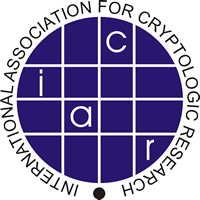eprint.iacr.org/1996/001
Preview meta tags from the eprint.iacr.org website.
Linked Hostnames
5- 21 links toeprint.iacr.org
- 1 link tocreativecommons.org
- 1 link toia.cr
- 1 link toiacr.org
- 1 link towww.iacr.org
Thumbnail

Search Engine Appearance
Incoercible Multiparty Computation
Current secure multiparty protocols have the following deficiency. The public transcript of the communication can be used as an involuntary <B>commitment</B> of the parties to their inputs and outputs. Thus parties can be later coerced by some authority to reveal their private data. Previous work that has pointed this interesting problem out contained only partial treatment. In this work we present the first general and rigorous treatment of the coercion problem in secure computation. First we present a general definition of protocols that provide resilience to coercion. Our definition constitutes a natural extension of the general paradigm used for defining secure multiparty protocols. Next we show that if trapdoor permutations exist then any function can be incoercibly computed (i.e., computed by a protocol that provides resilience to coercion) in the presence of computationally bounded adversaries and only public communication channels. This holds as long as less than half the parties are coerced (or corrupted). In particular, ours are the first incoercible protocols without physical assumptions. Also, our protocols constitute an alternative solution to the recently solved adaptive security problem.
Bing
Incoercible Multiparty Computation
Current secure multiparty protocols have the following deficiency. The public transcript of the communication can be used as an involuntary <B>commitment</B> of the parties to their inputs and outputs. Thus parties can be later coerced by some authority to reveal their private data. Previous work that has pointed this interesting problem out contained only partial treatment. In this work we present the first general and rigorous treatment of the coercion problem in secure computation. First we present a general definition of protocols that provide resilience to coercion. Our definition constitutes a natural extension of the general paradigm used for defining secure multiparty protocols. Next we show that if trapdoor permutations exist then any function can be incoercibly computed (i.e., computed by a protocol that provides resilience to coercion) in the presence of computationally bounded adversaries and only public communication channels. This holds as long as less than half the parties are coerced (or corrupted). In particular, ours are the first incoercible protocols without physical assumptions. Also, our protocols constitute an alternative solution to the recently solved adaptive security problem.
DuckDuckGo
Incoercible Multiparty Computation
Current secure multiparty protocols have the following deficiency. The public transcript of the communication can be used as an involuntary <B>commitment</B> of the parties to their inputs and outputs. Thus parties can be later coerced by some authority to reveal their private data. Previous work that has pointed this interesting problem out contained only partial treatment. In this work we present the first general and rigorous treatment of the coercion problem in secure computation. First we present a general definition of protocols that provide resilience to coercion. Our definition constitutes a natural extension of the general paradigm used for defining secure multiparty protocols. Next we show that if trapdoor permutations exist then any function can be incoercibly computed (i.e., computed by a protocol that provides resilience to coercion) in the presence of computationally bounded adversaries and only public communication channels. This holds as long as less than half the parties are coerced (or corrupted). In particular, ours are the first incoercible protocols without physical assumptions. Also, our protocols constitute an alternative solution to the recently solved adaptive security problem.
General Meta Tags
13- titleIncoercible Multiparty Computation
- charsetutf-8
- viewportwidth=device-width, initial-scale=1, shrink-to-fit=no
- citation_titleIncoercible Multiparty Computation
- citation_authorRan Canetti
Open Graph Meta Tags
7- og:imagehttps://eprint.iacr.org/img/iacrlogo.png
- og:image:altIACR logo
- og:urlhttps://eprint.iacr.org/1996/001
- og:site_nameIACR Cryptology ePrint Archive
- og:typearticle
Link Tags
4- apple-touch-icon/img/apple-touch-icon-180x180.png
- shortcut icon/favicon.ico
- stylesheet/css/dist/css/bootstrap.min.css
- stylesheet/css/eprint.css?v=10
Links
25- https://creativecommons.org/licenses/by/4.0
- https://eprint.iacr.org
- https://eprint.iacr.org/1996/001.ps
- https://eprint.iacr.org/about.html
- https://eprint.iacr.org/byyear